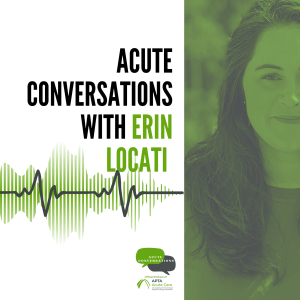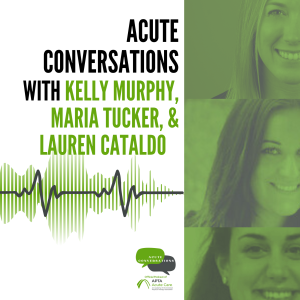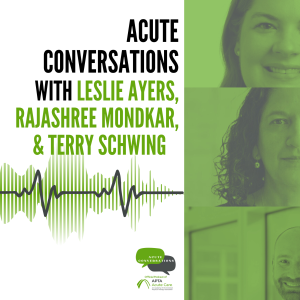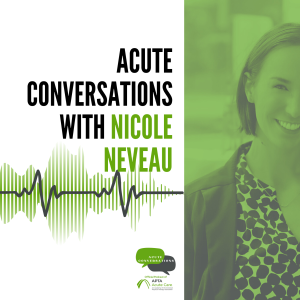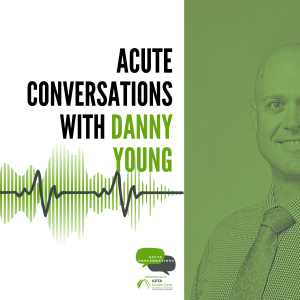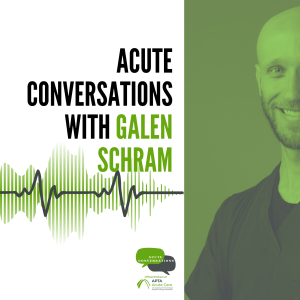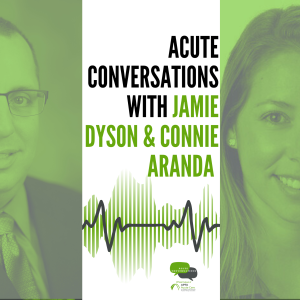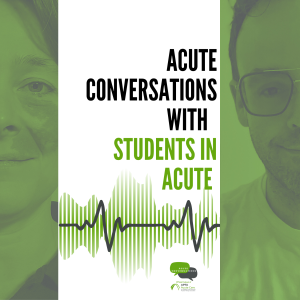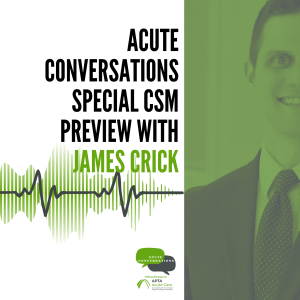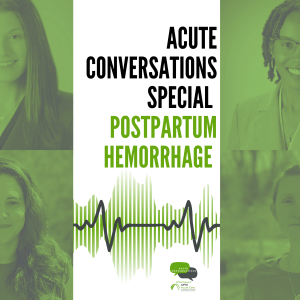Discover Acute Conversations
Acute Conversations

58 Episodes
Reverse
What happens when physical therapy enters the high-risk pregnancy unit? Erin Locati, PT, DPT, joins us to break down how acute care therapists can make a meaningful impact on maternal health—far beyond what most expect.
In this episode, Erin shares her unique path from chemical engineering to acute care PT, and how her own pregnancies shaped her clinical mission. We explore the misconceptions around bedrest, how to support OB teams without overstepping, and why physical therapy should be standard in high-risk pregnancy and postpartum care.
Whether you’re a hospital-based PT, student, or someone curious about expanding care for pregnant patients—this episode will challenge assumptions and spark ideas.
Today’s Guests:
Erin Locati PT, DPT
erin@risepelvicpt.com
LinkedIn
Instagram: @erinlocati_pt
Guest Quotes:
9:11 “ …So I really felt alone navigating. Kind of my postpartum recovery and my injuries and return to activity and exercise. And then during my second pregnancy, I was diagnosed with a couple serious complications. And again, I just really felt alone and frustrated and not really knowing, well, what does it say for me to do? I don’t wanna accidentally hurt my baby by doing too much, and my doctor wasn’t super helpful about it. I knew that pelvic physical therapy was a specialty that existed. Where PTs work with pregnant and postpartum patients, but it was really more of an outpatient specialty as far as I knew.
And I was in acute care and I wanted to stay in acute care. Yeah. So I thought about, well, how can I help these populations where I am?
I mean, all these patients are here in the hospital. Almost everybody gives birth in a hospital in the US. So maybe there’s a way that I can provide skilled care in the setting I’m already in to pregnant and postpartum patients, and that’s really where it started.”
25:52 “ It’s looking at their restrictions and deciding, you know, with your skilled assessment, what level of exercise could they probably be doing within the restrictions they have. And again, going up to the max that it restriction allows them.
So that they can minimize the losses they’re gonna have from being on bedrest.”
Rapid Responses:
Do you have any good book recommendations?
“… My favorite book, love In the Time of Cholera by Gabriel Garcia Marquez.”
You know you work in acute care when…
” You can treat everything. You go from a cabbage to a knee replacement, to a stroke, to a pregnant patient.”
Links:
https://enhancedrecoveryafterdelivery.com/
https://www.facebook.com/share/g/1DbQbXixy8/
https://pelvicglobal.com/
Connect with our host and the podcast!
Leo Arguelles (LEE-O R-GWELL-IS)
largue2@uic.edu
Twitter @LeoArguellesPT
Interested in being a future guest?
APTA Acute Care:
Website
Awards
Journal Access
Twitter @AcuteCareAPTA
Facebook APTA Acute Care
Instagram @AcademyAcutePT
YouTube APTA Acute Care Podcast
APTA Acute Care Resources
APTA Adult Vital Signs
APTA Lab Values Document
Webinar Recordings
Show Notes:
How do physical therapists decide who needs therapy today—and how often—when resources are limited and patient needs change by the hour?
In this episode of Acute Conversations, hosts Leo Arguelles and Daniel Young sit down with Joshua Johnson, Sandra Passek, and Brittany Lapin to unpack the development and validation of PT-PENCIL, a clinical decision support tool designed to help acute care PTs prioritize care using real-world data.
The conversation goes beyond algorithms. The guests walk through how a multidisciplinary learning community shaped PT-PENCIL, why documentation quality matters more than we think, and how predictive models can support—rather than replace—clinical judgment. They also tackle the realities of “it depends,” workflow integration, and why identifying patients on the fence may be where therapy makes the biggest impact.
This episode is a must-listen for clinicians, educators, and leaders navigating triage, staffing, and value-based care in today’s hospitals.
Today’s Guests:
Joshua Johnson PT, DPT, PhD
joshua.johnson@duke.edu
Sandra Passek PT, DPT, Rehabilitation Manager Clinical Informatics at Cleveland Clinic
Brittany Lapin PhD, Associate Professor of Biostatistics
lapinb@ccf.org
https://www.linkedin.com/in/brittany-lapin-004710b/
Guest Quotes:
7:44 “ I can’t help therapists set a frequency at the outset of a patient’s hospitalization. The best thing we could do and what we felt like really was the most appropriate thing to do was help therapists recognize which patients they needed to see the next day.”
20:43 “really what we found is that everybody benefits from PT. And so that ended up having a lot of discussions with the learning community about how do we then flag patients based on like clinically driven decisions rather than just the statistical model?”
32:27 “ So while we said a lot about helping individual clinicians make decisions about triage. I also think that there’s an opportunity here for managers and leaders to think through, how can I do something like that to support the clinicians that work for me.”
Rapid Responses:
What patient population do you enjoy thinking about or working with the most?
Brittany: “ As a statistician, I like surgical patients the most because there’s a date, there’s a pre and there’s a post.”
Sandi “I like the geriatric population. It doesn’t matter what it is. I think there’s just a lot to learn from them.”
Josh “ When I see patients I’m usually on our neurological floor and I really enjoy that. But I’ll admit a bias that I’ve, this little bit of time that I’ve spent in cardiovascular ICUs have been absolutely fascinating. And if I were to do full-time clinical care, I’d want to get trained to really take care of that population.”
You know you work in acute care when…
Josh “ Your treatment plan changes three times before you make it from the doorway to the edge of the bed.”
Sandi “Things change all the time in acute care. You just have to be ready for it. You have to be resilient and just move with it.”
Brittany “ 📍 Lots of sensitivity analysis with your/any studies.”
Links:
https://academic.oup.com/ptj/article-abstract/105/9/pzaf093/8198102?redirectedFrom=fulltext
🎧 Connect with Our Hosts
Leo Arguelles (pronounced LEE-O R-GWELL-IS)
📧 largue2@uic.edu
🐦 Twitter: @LeoArguellesPT
Nicole Neveau, PT, DPT, NCS
📧 ngunder1@gmail.com
🔗 LinkedIn: Nicole Neveau
Danny Young, PT, DPT, PhD
📧 daniel.young@unlv.edu
🐦 X: @DLYoungDPTPhD
🌐 Bluesky: @dlyoungdptphd.bsky.social
🎧 Listen now on Spotify | Apple Podcasts
(Or wherever you get your podcasts)
#AcuteCare #PhysicalTherapy #ClinicalEducation #HealthcareLeadership
Interested in being a future guest?
APTA Acute Care:
Website
Awards
Journal Access
https://www.aptaacutecare.org/page/AspireandAchieveMentorshipProgram
Twitter @AcuteCareAPTA
Facebook APTA Acute Care
Instagram @AcademyAcutePT
YouTube APTA Acute Care Podcast
APTA Acute Care Resources
APTA Adult Vital Signs
APTA Lab Values Document
Webinar Recordings
Show Notes S4E1
Burnout isn’t just a buzzword — it’s a lived experience for many clinicians working in hospital settings. In the Season 4 premiere of Acute Conversations, co-hosts Dr. Leo Arguelles and Dr. Danny Young are joined by Kelly Murphy, PT, DPT; Maria Tucker, PT, DPT; and Laura Cataldo, MOT, OT to unpack what burnout really looks like in acute care — and what can actually be done about it.
Drawing from their published work in the Journal of Acute Care Physical Therapy and their experience leading a departmental burnout initiative at Beth Israel Deaconess Medical Center, the guests break down how burnout is defined, how it can be measured, and why it so often goes unrecognized until clinicians are already depleted. They explore the core components of burnout — emotional exhaustion, depersonalization, and diminished personal accomplishment — and why acute care environments uniquely intensify each one.
The conversation goes beyond awareness to action, highlighting both individual strategies and system-level interventions that can help clinicians reconnect with purpose while still navigating high-acuity, high-demand settings. From grounding techniques that work mid-shift to organizational changes that foster transparency, recognition, and trust, this episode offers a practical and hopeful framework for clinicians who want to keep showing up — without losing themselves in the process.
Today’s Guests:
Kelly Murphy PT, DPT
kamurphy0615@gmail.com
Maria Tucker PT, DPT
mtucker4@bidmc.harvard.edu
Laura Cataldo MOT, OT
lecataldoqu@gmail.com
Guest Quotes:
11:14 Laura “ …in our research, it, burnout is not something that can be fixed by doing individual interventions alone. And in a setting such as a hospital, or other large organizations, you really have to focus on organizational changes as well to have an effect on burnout.”
26:21 Maria “… another like self-reflection piece is like, yeah, we’re burnt out, but also our managers and leadership and everybody, like they’re burnt out as well.
… but realizing and saying, they can be burnt out and they are burnt out and we’re just experiencing a different area of burnout or a reason for burnout. But at the end of the day, we all have the same like kind of feelings.”
32:05 Kelly “ I think it just brought general awareness to how good it feels to remind our staff. Shout each other out or thank someone for their help thing. And then, gosh, I still, to this day, every day on my commute home on the train there’s one intervention that we talk about in here. Three good things. I still do that every day on the way home because I’m like, you know what? Even if this was the worst day ever and my patients. Really had a hard day all day. I can still choose three good things, even if it’s not patient care related.”
Rapid Responses:
What’s your best stress relief activity on the weekends when you’re not working?
Ski and golf. Oh, we’re all answering…I like going for a walk with my dog.
You know you work in acute care when…
Laura “When your knee deep in bodily fluids”
Maria “ When you have determined both your worst and best outcome for every single patient before you enter the room.”
Kelly “ When you come down to lunch and different scrubs and you start out the day in… Or if you’re throwing away your sneakers, like it’s beyond just a bleach wipe.”
Links:
https://journals.lww.com/jacpt/abstract/2025/04000/assessing_and_managing_prevalence_of_burnout_in.1.aspx
🎧 Connect with Our Hosts
Leo Arguelles (pronounced LEE-O R-GWELL-IS)
📧 largue2@uic.edu
🐦 Twitter: @LeoArguellesPT
Nicole Neveau, PT, DPT, NCS
📧 ngunder1@gmail.com
🔗 LinkedIn: Nicole Neveau
Danny Young, PT, DPT, PhD
📧 daniel.young@unlv.edu
🐦 X: @DLYoungDPTPhD
🌐 Bluesky: @dlyoungdptphd.bsky.social
🎧 Listen now on Spotify | Apple Podcasts
(Or wherever you get your podcasts)
#AcuteCare #PhysicalTherapy #ClinicalEducation #HealthcareLeadership
Interested in being a future guest?
APTA Acute Care:
Website
Awards
Journal Access
https://www.aptaacutecare.org/page/AspireandAchieveMentorshipProgram
Twitter @AcuteCareAPTA
Facebook APTA Acute Care
Instagram @AcademyAcutePT
YouTube APTA Acute Care Podcast
APTA Acute Care Resources
APTA Adult Vital Signs
APTA Lab Values Document
Webinar Recordings
Show Notes
Specialization can shape a therapist’s confidence, identity, and long-term trajectory — but the pathways to get there aren’t always clear. In this episode of Acute Conversations, co-hosts Dr. Leo Arguelles and Dr. Nicole Neveau sit down with Dr. Leslie Ayres, Rajashree Mondkar, and Dr. Terry Schwing to explore what it really takes to pursue the Cardiovascular & Pulmonary (CCS) specialty.
Together, they unpack three very different journeys: the traditional pathway, residency-based training, and fellowship experience. Leslie reflects on how a single listserv email led her to a CVP residency five years into practice. Rajashree shares what it meant to become one of the first CCS clinicians in Texas back in 1994. Terry explains how fellowship training and outcomes research shaped his voice in ICU mobility and cardiopulmonary care.
Across their stories, one message stands out: there is no single “right” pathway — but there is always a spark. Listeners will hear candid reflections on mentorship, research expectations, clinical identity, and how specialization deepens bedside reasoning across acute care settings.
Whether you’re a student curious about your future or a clinician considering your next step, this conversation offers clarity, inspiration, and practical insight into navigating the specialization journey.
Today’s Guests:
Leslie Ayers PT, DPT, EdD, CCS
leslie.ayres@unthsc.edu
Rajashree Mondkar PT, MSPT, CCS
MondkarR@gmail.com
Terry Schwing PT, DPT CCS
Guest Quotes:
6:47 Leslie “ And that’s really what inspired me was just, I was thinking, I want to know more about these patients. I wanna get better at treating these patients. I wanna be an expert at this.”
17:34 Terry “ I think specialization really gives you an opportunity to delve deep into what you’re interested in and learn probably a lot more than you maybe thought you would need to know or I topics outside of maybe what your niche current interest is in. And it opens up your world as to all the different things that physical therapy is able to provide for patients.”
20:07 Rajashree “ I think they students, definitely very important because even if you’re not ready to do specialization, as soon as you are out, because you need few years of experience, you need to find where you are passionate about. You can see that even if there, there are many places, maybe the residencies are not available for cardiopulmonary, but you can reach out… You can find mentoring, mentorship, you can find avenues how to get there. And people are, I think people are eager to always guide others. To get to where you are. And that’s how our profession grows.”
Rapid Responses:
How fast do you think you could run a hundred meters pushing a crash cart?
Leslie “ So my rule for running is to finish in the upright position, but you don’t have to be first. So as long as you get there cart intact, it doesn’t matter how long it takes.”
Rajashree “ And my goal is to get there and not that crash cart meeting for me.”
Terry “ Yeah. I don’t know. I feel like a lot of the crash carts sometimes have rickety wheels, so I might just be trying to get it there as well. And just not falling and tipping the whole cart with me.”
You know you work in acute care when…
Leslie “ when you spent 30 minutes with a patient just to go to the restroom and their question is. That’s all we’re doing today.”
Rajashree “when you are untangling lines and wiping somebody’s bumps. I did not know in PT school when I went that I’ll be. “
Terry “ I guess I might say you’re an acute therapist and I always think about whenever I’m watching like TV shows or something like that and I see like someone intubated or an eek g on the screen and things like that. And I’m like, I’m always like, okay, is that the appropriate rhythm or intubation like method for like for this patient at that time? And I’m always like they did okay.”
Links:
Vital Pathways Webinar
Connect with our host and the podcast!
Leo Arguelles (LEE-O R-GWELL-IS)
largue2@uic.edu
Twitter @LeoArguellesPT
Nicole Neveau
ngunder1@gmail.com
LinkedIn
Danny Young
daniel.young@unlv.edu
X – @DLYoungDPTPhD
Bluesky – @dlyoungdptphd.bsky.social
Interested in being a future guest?
APTA Acute Care:
Website
Awards
Journal Access
https://www.aptaacutecare.org/page/AspireandAchieveMentorshipProgram
Twitter @AcuteCareAPTA
Facebook APTA Acute Care
Instagram @AcademyAcutePT
YouTube APTA Acute Care Podcast
APTA Acute Care Resources
APTA Adult Vital Signs
APTA Lab Values Document
Webinar Recordings
How do we measure what truly matters in acute care — and why does it finally feel possible to do it well?
In this week’s episode, co-hosts Dr. Nicole Neveau and Dr. Leo Arguelles sit down with Dr. Caitlyn Crandall and Dr. Lindsey Fresenko, two contributors to the new clinical practice guideline, “A Core Set of Outcome Measures to Assess Physical Function for Adults Participating in Physical Therapist Treatment in the Hospital.” Together, they unpack how this Core Outcome Measures (COMs) Set was built, what makes each measure clinically feasible, and how the guideline is already reshaping evaluation, communication, and discharge planning across hospital-based physical therapy.
Caitlyn and Lindsey share what surprised them during development, how psychometric rigor and real-world feasibility shaped the final set, and why standardized measurement doesn’t replace clinical reasoning — it strengthens it. They also preview their upcoming APTA Acute Care webinar and reflect on how a shared measurement language can help clinicians advocate for staffing, demonstrate value, and elevate patient care.
Whether you’re an ICU therapist, med-surg clinician, educator, or student, this conversation offers a clearer, more confident path for integrating outcome measures in acute care.
Today’s Guests:
Dr. Caitlyn Crandall, PT, DPT, CCS, RYT
Email: caitlyn.crandall@unchealth.unc.edu
LinkedIn: https://www.linkedin.com/in/caitlyn-crandall-dpt
Instagram: @CaitlynCrandall
Dr. Lindsey Fresenko, PT, DPT, PhD
Email: lindsey.fresenko@utoledo.edu
Publications:
• PTJ CPG: https://academic.oup.com/ptj/article/105/6/pzaf076/8140951
• CC&E Journal: https://journals.lww.com/ccejournal/fulltext/2024/12000/rehabilitation_and_social_determinants_of_health.8.aspx
Guest Quotes:
Caitlyn:
“These outcome measures aren’t meant to replace clinical decision-making — they’re meant to support it.”
Lindsey:
“The importance of having an evidence-based core outcome measure set is now utilizing it in practice.”
Caitlyn:
“Parts of these outcome measures are already what we’re doing. The COMs help organize and standardize it.”
Rapid Responses:
What’s the dumbest way you’ve injured yourself?
• Caitlyn: “I fell off my horse — he stopped, I kept going.”
• Lindsey: “I stepped on my own pinky toe in middle school and broke it.”
You know you work in acute care when…
• Caitlyn: “You’ve led a parade down the hallway with ECMO, an IABP, and half the team following behind.”
• Lindsey: “Carrying socks in your pocket is an everyday thing.”
Links:
A Core Set of Outcome Measures to Assess Physical Function for Adults Participating in Physical Therapist Treatment in the Hospital- https://pubmed.ncbi.nlm.nih.gov/40403754/
🎧 Connect with Our Hosts
Leo Arguelles (pronounced LEE-O R-GWELL-IS)
📧 largue2@uic.edu
🐦 Twitter: @LeoArguellesPT
Nicole Neveau, PT, DPT, NCS
📧 ngunder1@gmail.com
🔗 LinkedIn: Nicole Neveau
Danny Young, PT, DPT, PhD
📧 daniel.young@unlv.edu
🐦 X: @DLYoungDPTPhD
🌐 Bluesky: @dlyoungdptphd.bsky.social
🎧 Listen now on Spotify | Apple Podcasts
(Or wherever you get your podcasts)
Show Notes:
What does it take to move ICU rehab forward — and who’s leading the charge?
In this episode, co-hosts Dr. Leo Arguelles and Dr. Daniel Young sit down with Dr. Monica Silva Damasceno (MD Anderson Cancer Center) and Dr. Vinh Tran (University of New Mexico) — two clinicians who shared the stage at CSM’s ICU Rehab panel alongside Dale Needham, Jen Ryan, and Chris Wells.
Together, they unpack what’s changing in critical care physical therapy — from dismantling barriers and writing mobility into unit culture, to building true interprofessional collaboration that lasts beyond a single champion.
Monica shares her journey from Brazil to Houston Methodist’s Critical Care Fellowship, and how mentorship shaped her vision for ICU practice. Vinh reflects on his path from cardiac medicine to academia, bridging implementation science with bedside experience.
The conversation highlights the power of structure, communication, and persistence in advancing early mobility — especially in smaller hospitals where “doing more with less” is a daily reality.
Today’s Guests:
Monica Damasceno PT, DPT, CCS
monicasdapt@gmail.com
linkedin.com/in/monica-silva-damasceno-pt-dpt-ccs-03989965
Vihn Tran PT, DPT, PhD, CCS
https://www.linkedin.com/in/vinh-tran-169015200/
Guest Quotes:
15:25 Vihn “ I agree in the shorter duration just because by necessity, if they’re in the ICU, they’re medically unstable, right? So you’re limited on how aggressive you can be, although I do think we can be more aggressive than the average person thinks. So yeah, I think that seems reasonable to, to shorter sessions, but perhaps more frequently. With a caveat that there is potential out there to do longer sessions in certain really niche or precise circumstances.”
20:24 Advice for those therapists that working like the smaller kind of rural community hospitals that wanna kind of make a dent and or wanna start implementing more ICU rehab?
Vihn “ ..really, it’s not just a PT or rehab driven process, right. Like we in rehab can just flick a switch and all of a sudden this happens. It requires an extensive amount of collaboration between providers, nurses, techs, your own staff, your equipment managers. Everyone needs to be on board with what the overall aim is. So in order to really get the ball rolling first to me, like identify champions in, in allied communities. So whether it’s a nursing manager that potentially sees the value in early mobility, perhaps it’s a Mutually beneficial relationship where we can provide higher quality therapy or an earlier timeframe. At the same time, we can relieve some of the mobility tasks that nursing might have to do or help them do it in a more safe aspect.”
Monica “ ..having an agreement with your team and having the the champions. One from or multiple people from different groups, a doctor, nurses, and then have a plan of what you see for your unit in the future with this, those people, and create your practices like every day. Cultivating that practice of mobility and encouraging and helping each other.”
29:06 Monica “ one of the strategies to try to encourage more mobility is asking. What is the mobility plan during the rounds? Any rounds you have to have an answer. Then, then you think about mobility.”
Rapid Responses:
What’s your go-to karaoke song?
Monica: “it is Mariah Carey. It’s song Mariah Carey. Always Mariah Carey. Yeah. Any song that I can find? Mariah Carey. Which is the hardest to sing. Can you imagine talking about the scales there?
Vihn: I’m from St. Louis and I love Nelly, so I just gotta go with Nelly.”
You know you work in acute care when…
Vihn: “ When you don’t care what you’re wearing in the work or how you look, I should say that way.”
Monica: “ The scrubs have extra scrubs, I would say and all. And also having the safety pins in your pocket to secure the lines.”
Links:
https://orcid.org/0009-0009-6275-4362
🎧 Connect with Our Hosts
Leo Arguelles (pronounced LEE-O R-GWELL-IS)
📧 largue2@uic.edu
🐦 Twitter: @LeoArguellesPT
Nicole Neveau, PT, DPT, NCS
📧 ngunder1@gmail.com
🔗 LinkedIn: Nicole Neveau
Danny Young, PT, DPT, PhD
📧 daniel.young@unlv.edu
🐦 X: @DLYoungDPTPhD
🌐 Bluesky: @dlyoungdptphd.bsky.social
🎧 Listen now on Spotify | Apple Podcasts
(Or wherever you get your podcasts)
Show Notes
Acute care physical therapists have long known that their work is different—fast-paced, data-driven, and grounded in collaboration at the highest level of care. Now, that difference is finally being recognized.
In this episode of Acute Conversations, Dr. Jennifer Ryan joins hosts Dr. Leo Arguelles and Dr. Daniel Young to share an inside look at the ongoing effort to establish Acute Care as a board-certified specialty through ABPTS. Jen traces the movement’s roots from the early 2000s to today’s evidence-rich, residency-supported landscape and explains what the next steps mean for clinicians at the bedside.
From lessons learned through years of research and advocacy to the evolving role of interprofessional collaboration, this conversation highlights the depth and expertise of hospital-based PT practice. Whether you’re a new grad or a seasoned clinician, this episode will leave you inspired to see acute care not just as a setting—but as a specialty built on purpose, complexity, and professional pride.
Today’s Guests:
Jennifer Ryan PT, DPT, MS
APTA Acute Care Vice president and Project Coordinator of the Petition for Specialization
jennifer-ryan@northwestern.edu
Guest Quotes:
10:31 “ when I hear colleagues say like, acute care is a specialty, really? It tells me that I need to help them understand what we do.”
24:01 “…in this whole specialty assessment, in this really long survey you had to have a understanding of physiology and a pathophysiology of every body system. You have to have a keen awareness of not necessarily. Everything memorized, right? But a keen awareness of your level of awareness of those and your need to seek out more resources, or you need to confirm information you know, and then all the clinical sciences, all the laboratory values, all the imaging, all the pieces like that.”
26:14 “So now we’re in the perfecting phase one phase. And so demand is one of the categories and need is one of the categories. Demand is how many PTs will. Want to sit for specialization and the turnaround time and all that…The need piece is like. Why do you need PTs to work function at this level? Is someone else taking care of it?”
Rapid Responses:
Now you’ve lived in Chicago your whole life, but if you weren’t in the city, where would you go for fun?
“Well, I live in the burbs. I work in the city. That’s been 99% of my experience. I’m never gonna live more than a half a tank of gas from Mount Prospect, Illinois. That’s, and where would I go for fun? I totally love being in my garden. I was picked, I picked about 40 things outta my garden, brought ’em to work today. I, yeah, fun. Fun is like where my family is. My dogs are all that kind of thing.”
You know you work in acute care when…
“ You know you’re working at acute care when it’s. No big deal to stand in the bathroom with a complete stranger. “
Links:
https://specialization.apta.org/for-specialists/volunteer/specialization-academy-of-content-experts
https://academy.aptaacutecare.org/
🎧 Connect with Our Hosts
Leo Arguelles (pronounced LEE-O R-GWELL-IS)
📧 largue2@uic.edu
🐦 Twitter: @LeoArguellesPT
Nicole Neveau, PT, DPT, NCS
📧 ngunder1@gmail.com
🔗 LinkedIn: Nicole Neveau
Danny Young, PT, DPT, PhD
📧 daniel.young@unlv.edu
🐦 X: @DLYoungDPTPhD
🌐 Bluesky: @dlyoungdptphd.bsky.social
🎧 Listen now on Spotify | Apple Podcasts
(Or wherever you get your podcasts)
#AcuteCare #PhysicalTherapy #ClinicalEducation #HealthcareLeadership
Interested in being a future guest?
APTA Acute Care:
Website
Awards
Journal Access
https://www.aptaacutecare.org/page/AspireandAchieveMentorshipProgram
Twitter @AcuteCareAPTA
Facebook APTA Acute Care
Instagram @AcademyAcutePT
YouTube APTA Acute Care Podcast
APTA Acute Care Resources
APTA Adult Vital Signs
APTA Lab Values Document
Webinar Recordings
2026 Elections
Show Notes
In this episode of Acute Conversations, we welcome Dr. Nicole Neveau, PT, DPT, NCS — Director of Rehabilitation Services at SSM Health St. Louis University Hospital and our newest co-host.
Nicole shares her path into acute care, from unfolding paper charts as a new grad to leading a team of more than 100 therapists. She reflects on lessons learned in trauma and neuro ICUs, the importance of mentorship, and why she sees therapists as consultants who guide recovery through evidence, collaboration, and patient stories.
Alongside host Dr. Leo Arguelles, Nicole also previews the upcoming 2026 Bridge the Gap Conference in Chicago and what it means for connecting research with practice.
Today’s Guests:
Nicole Neveau, PT, DPT, NCS
📧 ngunder1@gmail.com
🔗 LinkedIn: Nicole Neveau
Guest Quotes:
14:35 “ In acute care, it’s about the story. Of where that patient is right now and about that risk adjustment of what? As a physical therapist, I need to dose intervention to maximize their recovery without increasing their risk of harm at the point where they are the most critically ill.”
28:28 “ We have to be more precise about how we apply our services and, and be a consulting service… it also means that as clinicians we’re making decisions that frontline are making decisions with their caseload every day. Yeah. It’s not a simple, here’s your list of six people that you’re gonna go see. Don’t stop until you see all of ’em. Mm-hmm. It’s much more like, what do your people on this list need to maximize their recovery to help with their discharge planning and how are you going to let your day unfold?”
Rapid Responses:
What snack best represents you?
“Oh, just all the time. I don’t even know that there needs to be one. I am a snacker. I love Chips or cookies or you know what, I, I love coffee, so I drink a lot of coffee, so that might be, I, if I had to pick one snack forever, it would be Coffee with a lot of cream and sugar in it.”
You know you work in acute care when…
“ when you have scratched your patient’s back for the first time and they just start melting and saying, oh my gosh, no one’s done. You know, I’ve been on my back in this bed. So that’s, it’s it. The little things, it build thing. You build a relationship.”
Links:
https://www.aptaacutecare.org/page/bridgethegap
🎧 Connect with Our Hosts
Leo Arguelles (pronounced LEE-O R-GWELL-IS)
📧 largue2@uic.edu
🐦 Twitter: @LeoArguellesPT
Nicole Neveau, PT, DPT, NCS
📧 ngunder1@gmail.com
🔗 LinkedIn: Nicole Neveau
Danny Young, PT, DPT, PhD
📧 daniel.young@unlv.edu
🐦 X: @DLYoungDPTPhD
🌐 Bluesky: @dlyoungdptphd.bsky.social
🎧 Listen now on Spotify | Apple Podcasts
(Or wherever you get your podcasts)
#AcuteCare #PhysicalTherapy #ClinicalEducation #HealthcareLeadership
Interested in being a future guest?
APTA Acute Care:
Website
Awards
Journal Access
https://www.aptaacutecare.org/page/AspireandAchieveMentorshipProgram
Twitter @AcuteCareAPTA
Facebook APTA Acute Care
Instagram @AcademyAcutePT
YouTube APTA Acute Care Podcast
APTA Acute Care Resources
APTA Adult Vital Signs
APTA Lab Values Document
Webinar Recordings
2026 Elections
Show Notes
What inspires someone to change the course of their career — and, ultimately, their profession? In this episode of Acute Conversations, we introduce our newest co-host, Dr. Daniel (Danny) Young, PT, DPT, PhD. Danny shares the moment a chance encounter sparked his passion for physical therapy, his early experiences pioneering ICU mobility at Creighton, and his transition into academia at UNLV.
Alongside host Dr. Leo Arguelles, Danny reflects on the role of mentorship, the challenge of building confidence in new clinicians, and why generating stronger evidence is essential for advancing acute care practice. From personal stories to research insights, Danny brings both candor and vision to his new role on the podcast team.
Today’s Guests:
Danny Young, PT, DPT, PhD
📧 daniel.young@unlv.edu
🐦 X: @DLYoungDPTPhD
🌐 Bluesky: @dlyoungdptphd.bsky.social
Guest Quotes:
11:28: “…the lack of confidence is a reflection most often of just some. Some humility that the students have. And so I try to reassure students that it’s a good thing that they feel a little bit hesitant and unsure of themselves. That it’s a recognition of the things that they don’t know. So I, I just first want to acknowledge that not feeling confident is okay. Yeah. And is actually something that’s probably reflects some good attributes.”
15:40: “ One of the things that fairly quickly started to really bother me was the debates that I would have with nurses or physicians… I’ve received such opposition for so many patients about early intervention. That I, I went and did a literature search, you know, because I didn’t get any training in school about early intervention. Like I said, it wasn’t a common part of practice then. Right. And. So I do a literature search and I find nothing, there was no evidence. Now there was evidence that bedrest was bad, right? Right. So we had evidence that staying in bed was a problem. What we didn’t have was evidence that it was safe or helpful to start mobilizing those people earlier. And most of the physicians and nurses at that time just assumed that there’s no way around the negative effects of bedrest for these people who are really sick. There’s no evidence to inform these decisions that I have to make every day. And that’s gotta change. And. Why am I not the person to try and answer those questions?”
35:26: “ I think we’ve got to have better evidence and I’m. I’m committed to trying to help to create it.”
Rapid Responses:
What’s your most favorite way to exercise, Danny?
“ I commute by bike. I spend between two and two and a half hours every day riding a bike to and from the campus here.And I love mountain biking as well. So commuting is, is how I get most of my fitness. But I, every time I can get out on the dirt trails, I do that too.”
You know you work in acute care when…
You wear different clothes home than you wore when you went in. You have to change during the day.
🎧 Connect with Our Hosts
Leo Arguelles (pronounced LEE-O R-GWELL-IS)
📧 largue2@uic.edu
🐦 Twitter: @LeoArguellesPT
Nicole Neveau, PT, DPT, NCS
📧 ngunder1@gmail.com
🔗 LinkedIn: Nicole Neveau
Danny Young, PT, DPT, PhD
📧 daniel.young@unlv.edu
🐦 X: @DLYoungDPTPhD
🌐 Bluesky: @dlyoungdptphd.bsky.social
🎧 Listen now on Spotify | Apple Podcasts
(Or wherever you get your podcasts)
#AcuteCare #PhysicalTherapy #ClinicalEducation #HealthcareLeadership
Interested in being a future guest?
APTA Acute Care:
Website
Awards
Journal Access
https://www.aptaacutecare.org/page/AspireandAchieveMentorshipProgram
Twitter @AcuteCareAPTA
Facebook APTA Acute Care
Instagram @AcademyAcutePT
YouTube APTA Acute Care Podcast
APTA Acute Care Resources
APTA Adult Vital Signs
APTA Lab Values Document
Webinar Recordings
2026 Elections
Show Notes
Ethel Frese, PT, DPT, MHS, CCS, FAPTA is one of the most respected voices in acute and cardiopulmonary physical therapy. In this episode, she shares the pearls that will energize your practice and growth—from building stronger patient connections to fostering collaboration with the healthcare team. Whether you’re new to acute care or a seasoned clinician, her insights will challenge, inspire, and remind you why this work matters.
Today’s Guests:
Ethel Frese, PT, DPT, MHS, CCS, FAPTA
Professor Emeritus Saint Louis University, Cardiovascular and Pulmonary Certified Clinical Specialist
ethel.frese@health.slu.edu
Guest Quotes:
17:46 “ the therapist who took my place in Chattanooga… she’s always told students and people that I’ve worked with that one of the best gifts to me as a teacher is to have someone you’ve taught do better than the teacher. And I have a lot of really good gifts that way. Lots of people I’ve seen have gone way beyond their teacher and, and that’s huge to me.”
28:54 “ I think that’s a value of teaching. You have to go back and think, now, why do I do it that way?”
Rapid Responses:
Name one therapist that has been influential in your career.
“Oh, that’s an easy one. Her name is Mary Chrisman. She was the therapist that I went to at the hospital when the other therapist would not answer my questions. And she’s a friend even to today…
You know you work in acute care when…
“When you can manage. I’m gonna say acute illness, but you know, ill patients who need specialist, very specialized care. And that you can manage the, the really sick patients and the not so sick. Yeah. And you know, you’re good at vital signs and ECG and ventilators and all the machinery that you see in acute care. Yeah. So, I guess that’s my answer.”
🎧 Connect with Our Hosts
Leo Arguelles (pronounced LEE-O R-GWELL-IS)
📧 largue2@uic.edu
🐦 Twitter: @LeoArguellesPT
Nicole Neveau, PT, DPT, NCS
📧 ngunder1@gmail.com
🔗 LinkedIn: Nicole Neveau
Danny Young, PT, DPT, PhD
📧 daniel.young@unlv.edu
🐦 X: @DLYoungDPTPhD
🌐 Bluesky: @dlyoungdptphd.bsky.social
🎧 Listen now on Spotify | Apple Podcasts
(Or wherever you get your podcasts)
#AcuteCare #PhysicalTherapy #ClinicalEducation #HealthcareLeadership
Interested in being a future guest?
APTA Acute Care:
Website
Awards
Journal Access
https://www.aptaacutecare.org/page/AspireandAchieveMentorshipProgram
Twitter @AcuteCareAPTA
Facebook APTA Acute Care
Instagram @AcademyAcutePT
YouTube APTA Acute Care Podcast
APTA Acute Care Resources
APTA Adult Vital Signs
APTA Lab Values Document
Webinar Recordings
2026 Elections
Show Notes
What does it mean to practice “informative care” in the hospital setting—and how can rehab providers help patients undergoing cancer treatment stay strong throughout their hospitalization?
In this episode, we speak with Galen Schram, PT, DPT, a board-certified clinical specialist in oncologic physical therapy and faculty member of the Acute Care PT Residency Program at NYU Langone Health. Galen shares his journey into acute care, his passion for serving hematology/oncology patients, and how he leverages interdisciplinary collaboration to support patients across phases of survivorship—including during hematopoietic stem cell transplant (HSCT).
We also touch on his background in narrative medicine, and how storytelling can enhance connection and meaning in clinical work.
🔗 Learn more about the July 30th APTA Acute Care webinar Galen is co-leading with OT colleague Emma Kiernan, hosted by the Practice Committee:
https://www.aptaacutecare.org/general/custom.asp?page=WebinarSeries
Today’s Guests:
Galen Schram PT, DPT
Board-Certified Clinical Specialist in Oncologic Physical Therapy
Galen.Schram@nyulangone.org
Guest Quotes:
12:58 “ But it’s still worthwhile for us to, to go in and do an assessment, provide some much needed education. I have all staff that work on the oncology population screen. Every single patient for CIPN ( Chemotherapy induced peripheral neuropathy) . This is often like something that can go under diagnosed. And, and just provide education about what maybe to expect….When a patient’s admitted to the hospital education is one of our most important interventions, for sure.”
20:30 “ …One example is I attend interdisciplinary rounds every Tuesday. So I hear from the nurse practitioners medically how the patients are doing. Based on my own chart reviews and hearing the nurse practitioners and the bedside nurses describe how the patients have been lately, I make a decision about which of my patients are candidates to go to my gym class.
So every Tuesday we host a gym class for patients who are medically appropriate and have the approval from their medical providers. So based on. My input from the nurse practitioners, that’s how I help decide which patients will make the best can candidates for that gym class, who will have the most success, who’s getting close enough to discharge that I really wanna optimize their strength for a home discharge.”
26:19 “ I always say like, I’m a human before, I’m a physical therapist. And I think my writing is one way that I’m able to reflect both of those things.”
Rapid Responses:
If you had a theme song before you walk into a patient’s room, what song would that be?
“The opening theme song to the show, the Mindy Project, which was a great show. I just love that song. So that would be it. It’s very upbeat and whimsical.”
You know you work in acute care when…
“ You are unfazed by. Am I allowed to curse by? By shit.”
Links:
July 30th Webinar: https://www.aptaacutecare.org/events/eventdetails.aspx?id=1977918
https://blreview.org/off-the-page/off-the-page-tattoos/
https://www.theintima.org/blog/on-trauma-and-hope-by-galen-schram
🎧 Connect with Our Hosts
Leo Arguelles (pronounced LEE-O R-GWELL-IS)
📧 largue2@uic.edu
🐦 Twitter: @LeoArguellesPT
Nicole Neveau, PT, DPT, NCS
📧 ngunder1@gmail.com
🔗 LinkedIn: Nicole Neveau
Danny Young, PT, DPT, PhD
📧 daniel.young@unlv.edu
🐦 X: @DLYoungDPTPhD
🌐 Bluesky: @dlyoungdptphd.bsky.social
🎧 Listen now on Spotify | Apple Podcasts
(Or wherever you get your podcasts)
#AcuteCare #PhysicalTherapy
Interested in being a future guest?
APTA Acute Care:
Website
Awards
Journal Access
https://www.aptaacutecare.org/page/AspireandAchieveMentorshipProgram
Twitter @AcuteCareAPTA
Facebook APTA Acute Care
Instagram @AcademyAcutePT
YouTube APTA Acute Care Podcast
APTA Acute Care Resources
APTA Adult Vital Signs
APTA Lab Values Document
Webinar Recordings
2026 Elections
Show Notes
What happens when acute care PTs create space to support, challenge, and elevate each other?
In this episode, hosts Nicole Neveau and Leo Arguelles speak with Tricia Healy, PT, DPT and Kim Levenhagen, PT, DPT about the Aspire & Achieve mentorship program—its origins, its impact, and the intentional matchmaking that has helped over 65 mentor-mentee pairs grow together.
They explore lessons learned from the first two cohorts, what makes mentorship meaningful, and how the program is evolving to support students, new grads, and seasoned clinicians alike.
🔍 Topics include:
The story behind the program’s creation
How mentor-mentee matches are made
Feedback from the first two cohorts
Success stories and future goals
The difference between mentorship, coaching, and clinical education
How to get involved (and who should apply)
🔗 Learn more or apply to be a mentor/mentee in the next cohort via APTA Acute Care.
🎙️ Today’s Guests
Tricia Healy, PT, DPT
Chair, Aspire and Achieve Committee
Practice Committee Member, Critical Edge Email Coordinator
Coordinator, Aspire and Achieve Mentor Program
📧 triciahealy@townisp.com
Kim Levenhagen, PT, DPT
Chair, Membership Committee
📧 kim.levenhagen@health.slu.edu
Guest Quotes:
6:11 Tricia “ survey data has been pretty consistent and people with or have been highly satisfied with the program…big part of it is the mentee’s commitment. The mentee really has to have goals to drive the relationship, and we stress that it’s mentee led, so the mentee leads the meetings, has the goals. So when that happens, when there’s. Good communication and a really motivated mentee and a mentor who’s willing to guide. It’s been really a really successful relationship for the pair.”
10:22 Kim “ I think that’s something that we need to continue to hone in on to find out what is the best way to match people. But there is a lot of intentionality, Tricia and I, it’s like a dating game almost.
Like we’ve got our Excel spreadsheets out, we’re matching people… and so what happens is, and we put a lot of thought into it, it’s not just random.”
Rapid Responses:
If you did not work in healthcare, what would your career be?
Kim: “Bartender”
Before you walk into a patient’s room, what would be your theme song?
Tricia “Don’t Stop Believing”
You know you work in acute care when…
Kim: “ When you correct a physician’s office about how they take vital signs”
Tricia: “ I have to go with you, keep a separate pair of shoes at work, that that doesn’t come home with you. That would be my danzko clogs”
Links:
Email- mentorprogram@aptaacutecare.org
https://www.aptaacutecare.org/page/AspireandAchieveMentorshipProgram
https://www.apta.org/fit-for-practice/practice-health/the-power-of-mentoring
https://www.youtube.com/watch?v=JOX2OPyH4x0
🎧 Connect with Our Hosts
Leo Arguelles (pronounced LEE-O R-GWELL-IS)
📧 largue2@uic.edu
🐦 Twitter: @LeoArguellesPT
Nicole Neveau, PT, DPT, NCS
📧 ngunder1@gmail.com
🔗 LinkedIn: Nicole Neveau
Danny Young, PT, DPT, PhD
📧 daniel.young@unlv.edu
🐦 X: @DLYoungDPTPhD
🌐 Bluesky: @dlyoungdptphd.bsky.social
Interested in being a future guest?
APTA Acute Care:
Website
Awards
Journal Access
https://www.aptaacutecare.org/page/AspireandAchieveMentorshipProgram
Twitter @AcuteCareAPTA
Facebook APTA Acute Care
Instagram @AcademyAcutePT
YouTube APTA Acute Care Podcast
APTA Acute Care Resources
APTA Adult Vital Signs
APTA Lab Values Document
Webinar Recordings
2026 Elections
Show Notes 2025
What do you really learn in acute care—and what does it feel like to use what you’ve learned in the classroom?
In this episode, we speak with Mika Mendoza, a recent UIC DPT graduate, who reflects on the clinical rotation that changed her perspective on physical therapy. From managing a complex discharge for a newly blind patient to navigating transplant floors and collaborating with interprofessional teams, Mika shares powerful insights on growth, uncertainty, and finding purpose in acute care.
This episode also marks the debut of our new co-host, Dr. Nicole Neveau, PT, DPT, who brings her experience as a CI and clinical leader into the conversation. Together, she and Leo explore mentorship, first-hand learning, and why exposure to acute care should be standard in DPT education.
Whether you’re a student, educator, or practicing clinician—this conversation will resonate.
Today’s Guests:
Mika Mendoza, SPT
mmendo47@uic.edu
https://www.linkedin.com/in/mika-mendoza-dpt2025/
Guest Quotes:
8:21 “ Interdisciplinary collaboration is, is key to acute care. It’s not just walking and it’s not just standing.”
19:33 “ …not all things were as straightforward as we had learned it in didactic.”
28:45 “ I feel like having students go into an acute care clinical rotation I think it’s just so important because you will never know. If you don’t try it, right? …Uou miss a hundred percent of the shots that you don’t take.
And I think it’s the same with acute care, especially because there are so many things that get debunked when you’re in an acute care clinical rotation.”
Rapid Responses:
What kind of shoes do you wear in acute care?
“Not White Ones”
You know you work in acute care when…
“ When you try to swipe your badge to get into your house”
Links:
https://www.aptaacutecare.org/page/2026Elections
Connect with our host and the podcast!
Leo Arguelles (LEE-O R-GWELL-IS)
largue2@uic.edu
Twitter @LeoArguellesPT
Nicole Neveau
ngunder1@gmail.com
LinkedIn
Danny Young
daniel.young@unlv.edu
X – @DLYoungDPTPhD
Bluesky – @dlyoungdptphd.bsky.social
Interested in being a future guest?
APTA Acute Care:
Website
Awards
Journal Access
https://www.aptaacutecare.org/page/AspireandAchieveMentorshipProgram
Twitter @AcuteCareAPTA
Facebook APTA Acute Care
Instagram @AcademyAcutePT
YouTube APTA Acute Care Podcast
APTA Acute Care Resources
APTA Adult Vital Signs
APTA Lab Values Document
Webinar Recordings
Show Notes:
🎙 Episode Description:
What’s it really like stepping into acute care as a DPT student? In this episode, we hear honest, eye-opening reflections from Fiona Kearns and Hannah Brandt, two near-graduates from UIC who just wrapped up a transformational clinical rotation. They share what surprised them, challenged them, and ultimately shaped their career paths.
PLUS—meet our new co-host, Dr. Danny Young! He brings his academic and clinical lens to the conversation, unpacking burnout, mentorship, and the deeper meaning behind acute care practice.
👂 Listen in for:• First impressions from a high-acuity hospital rotation• Navigating burnout (as students and clinicians)• Why acute care needs more visibility—and more students• Danny’s debut on the mic 🎤
Today’s Guests:
Hannah Brandt, SPT
hannah24brandt@gmail.com
Fiona Kerns, SPT
fkkearns2000@gmail.com
Guest Quotes:
On early exposure to Acute Care through Integrated Clinical Experiences (ICE):
Hannah 9:44 “ So definitely I think it’s very good we get early exposure to it. Especially ’cause I, for me, at least when I was applying to PT schools, was during covid. So a lot of shadowing hours in hospitals was not available just because of Covid experiences. So like while I would’ve liked to have experience before coming into PT school in that setting, I didn’t get any. So while I was like eager and excited to see it, it does come with a lot of nerves.”
Fiona 11:46 “ …And then my second ice visit experience. My patient had three seizures while we were in the room with him, and obviously like that can happen in the acute care setting. It’s not out of the question, but that was just kind of like a big like welcome to acute care for sure. Like this is, this is what it’s like to be here. So definitely like high paced, A lot of like adrenaline from those experiences, but definitely learned a lot and I really enjoyed them so.”
Danny 28:42 “ One of my favorite quotes comes from Viktor Frankl’s book man’s Search for Meaning. And he says he who has a why to live for can bear almost any how. And I think one of the problems that we have is. That we aren’t finding enough meaning in what we’re doing. We think what we need is ease and happiness in our jobs. And instead I think what we need is to recognize how meaningful what we’re doing is. And if we focus on the meaning in what’s happening, I think it will combat a lot of the burnout that we see.”
Rapid Responses:
Name a PT that’s been influential in your PT career so far.
Fiona: “Sarah and Julia are cis from this past clinical, for sure.”
Hannah: “ Dr. Jones, our neuro professor in our program.”
You know you work in acute care when…
Hannah: “ I would say when you’re reorienting your patient, but you don’t even know what day it is.”
Fiona: “ I say your friends stop letting you talk about your day during dinner, right?
Links:
https://www.aptaacutecare.org/page/2026Elections
Connect with our host and the podcast!
Leo Arguelles (LEE-O R-GWELL-IS)
largue2@uic.edu
Twitter @LeoArguellesPT
Danny Young
daniel.young@unlv.edu
Interested in being a future guest?
APTA Acute Care:
Website
Awards
Journal Access
https://www.aptaacutecare.org/page/AspireandAchieveMentorshipProgram
Twitter @AcuteCareAPTA
Facebook APTA Acute Care
Instagram @AcademyAcutePT
YouTube APTA Acute Care Podcast
APTA Acute Care Resources
APTA Adult Vital Signs
APTA Lab Values Document
Webinar Recordings
Show Notes
Today’s Guests:
Jamie Dyson PT, DPT
jamiedyson224@gmail.com
Constanza Aranda PT, DPT, MSPH
carandadpt@gmail.com
Guest Quotes:
3:34 Connie “ And that was when I said, wow, like, it would be so cool one day to be able to present in a such a big stage like CSM. And Jamie being the mentor that he is, he said, noted a little mental note and he said, I think we have just written our first goal as mentor mentee.”
7:07 Jamie “ It’s easier to be a mentor when your mentee takes an active role. Yeah. In, in the relationship. Too many mentees try to take a passive route.”
21:35 Jamie “ If you try to be too prescriptive as a mentor, I think that kind of turns the mentees off. If I had told Connie exactly what she needs to do every single day, she probably would’ve said, all right, enough of this guy, I’m outta here.”
Rapid Responses:
Before you walk into a patient’s room, what would be your theme song as you walk into that patient’s room?
-Connie “Eye of the Tiger”
You know you work in acute care when…
-Connie “You have a change of scrubs in the car”
Links:
https://www.aptaacutecare.org/page/AspireandAchieveMentorshipProgram
Connect with our host and the podcast!
Leo Arguelles (LEE-O R-GWELL-IS)
largue2@uic.edu
Twitter @LeoArguellesPT
Interested in being a future guest?
APTA Acute Care:
Website
Awards
Journal Access
Twitter @AcuteCareAPTA
Facebook APTA Acute Care
Instagram @AcademyAcutePT
YouTube APTA Acute Care Podcast
APTA Acute Care Resources
APTA Adult Vital Signs
APTA Lab Values Document
Webinar Recordings
Guests:
Kelly Xie, SPT
Northwestern University – DPT 2nd year student
zepei.xie@northwestern.edu
https://www.linkedin.com/in/kelly-xie1/
IG: @kellyyxie
Magon Liu, SPT
3rd year DPT student from Samuel Merritt University
magon.liu@gmail.com
https://www.instagram.com/magoffnoton/
Links:
https://www.aptaacutecare.org/page/Students
https://groups.io/g/aptaacutecarestudents
Guest Quotes:
You know that you are getting ready for an acute care physical therapy rotation when
Kelly: “ when I learned all these foundations of PT and CVP skills in class.”
You know that you are on acute care clinical when:
Magon: “ When your best friend is the gait belt and nursing.”
Connect with our hosts and the podcast!
Leo Arguelles (LEE-O R-GWELL-IS)
largue2@uic.edu
Twitter @LeoArguellesPT
Interested in being a future guest?
Apply to become our new co-host
Join our team: Assistant Producer
APTA Acute Care:
Website
Awards
Journal Access
Twitter @AcuteCareAPTA
Facebook APTA Acute Care
Instagram @AcademyAcutePT
YouTube APTA Acute Care Podcast
APTA Acute Care Resources
APTA Adult Vital Signs
APTA Lab Values Document
Webinar Recordings
Show Notes
Guests:
Alfredo Guadalupe, SPT
1st year DPT student from the University of Connecticut, and student leader of the east region for APTA Acute Care
alfredo.guadalupe@uconn.edu
Jama Bradfield, SPTA
PTA Program: Ivy Tech- Muncie
jbradfield4@ivytech.edu
IG: @jamashea
Links:
Guest Quotes:
You know that you’re in Acute care lab in PT school when:
Fred “You can feel Dr. Smith staring at you when you’re doing transfers across the room.”
You know that you’re getting ready for an acute care rotation when:
Jama: “You have to pack multiple pairs of clothes for one day. That would be my
first one. And then also you can speak in half lives and lab values.”
Connect with our hosts and the podcast!
Email the show if you would like join our team: aptaacpodcast@gmail.com
Leo Arguelles (LEE-O R-GWELL-IS)
largue2@uic.edu
Twitter @LeoArguellesPT
Interested in being a future guest?
Apply to become our new co-host
Join our team: Assistant Producer
APTA Acute Care:
Website
Awards
Journal Access
Twitter @AcuteCareAPTA
Facebook APTA Acute Care
Instagram @AcademyAcutePT
YouTube APTA Acute Care Podcast
APTA Acute Care Resources
APTA Adult Vital Signs
APTA Lab Values Document
Webinar Recordings
Show Notes
Guests:
James P. Crick, Jr., PT, DPT, PhD
Co-Chair, CSM Education Programming, APTA Acute Care
Links:
CSM 2025 APTA Acute Care Brochure
APTA CSM Program Portal
APTA CSM Events App
Guest Quotes:
“CSM isn’t just about education—it’s about collaboration and connection. This is where careers change, research starts, and lifelong mentorships form.” – James Crick
“If you’re coming to CSM, don’t just be a fly on the wall. Jump in, meet people, and find where you can contribute. That’s how I got started, and it changed everything.” – James Crick
Connect with our hosts and the podcast!
Email the show if you would like join our team: aptaacpodcast@gmail.com
Leo Arguelles (LEE-O R-GWELL-IS)
largue2@uic.edu
Twitter @LeoArguellesPT
Interested in being a future guest?
Apply to become our new co-host
Join our team: Assistant Producer
APTA Acute Care:
Website
Awards
Journal Access
Twitter @AcuteCareAPTA
Facebook APTA Acute Care
Instagram @AcademyAcutePT
YouTube APTA Acute Care Podcast
APTA Acute Care Resources
APTA Adult Vital Signs
APTA Lab Values Document
Webinar Recordings
Show Notes:
Guests:
Mary Fischer, PT, DPT, Board Certified Geriatric Clinical Specialist
mary.fischer@nyulangone.org
https://www.linkedin.com/in/mary-fischer-pt-dpt-gcs-571994b/
Kristine Josef PT, DPT, Board Certified Cardiovascular and Pulmonary Clinical Specialist
Kristine.Josef@nyulangone.org
Links:
https://journals.lww.com/asaiojournal/fulltext/2022/05000/safety_and_feasibility_of_an_early_mobilization.15.aspx
https://aptageriatrics.org/wp-content/uploads/2022/01/GeriNotes-23-6.pdf
https://www.cdc.gov/steadi/hcp/clinical-resources/inpatient-care.html
https://www.youtube.com/watch?v=qdm7C-fu7o0
https://www.cdc.gov/steadi/hcp/clinical-resources/index.html#cdc_listing_res2-clinical-tools
Guest Quotes:
Kristine 10:58: What take aways? do you have for clinicians on an everyday basis who maybe would be like, no, sign off on this patient? “If you’re gonna see this patient once, you might as well make it worth it. Right? So, You know, you see this patient and they’re, they’re already walking a lap in the hallway. But what is their fall risk? Right? 150 ft walking isn’t gonna tell you much. They can walk on a straight on an even surface in the hospital. That’s very benign.”
Mary 23:10 Did this change your practice at all working with your patient population?
“Definitely for me. I mean, doing outcome measures routinely, whichever ones are appropriate. Now, you know, I learned a little bit about the strength testing using a chair stand and we chose the five times to stand, which we talked about in our discussion that maybe wasn’t the best one. It’s got a very high you know, floor effect.
If you can’t do one you get a zero. So now we more routinely use the 30m second chair stand. And so we, so if I would say just for me, it’s like, yeah, pushing outcome measures.”
Mary 24:03 “Should we be walking our patients more quickly? “
Rapid Responses:
What’s your favorite outcome measure to use in practice?
Mary: “I jump right to the classic chair stand, whether it’s 30 or five times”
Kristine: “probably the 10 meter. It’s easy quick And we have to cross the streets in New York City.”
You know you work in acute care when:
Mary: “Well you know, you have the extra socks and sneakers in the locker. Code brown, code yellows…”
Kristine: “I pick scrubs with a cargo pocket on my thigh, so that I can hook the Foley catheter onto it. That’s nice. And it’s clutch. That’s so clutch. You gotta keep it below the waist.”
Connect with our hosts and the podcast!
Email the show if you would like join our team: aptaacpodcast@gmail.com
Leo Arguelles (LEE-O R-GWELL-IS)
largue2@uic.edu
Twitter @LeoArguellesPT
Ashley Poole
Twitter @AshleyPooleDPT
Interested in being a future guest?
APTA Acute Care:
Website
Awards
Journal Access
Twitter @AcuteCareAPTA
Facebook APTA Acute Care
Instagram @AcademyAcutePT
YouTube APTA Acute Care Podcast
APTA Acute Care Resources
APTA Adult Vital Signs
APTA Lab Values Document
Webinar Recordings
Show Notes
Guests:
Rebeca Segraves PT, DPT
Board-Certified Clinical Specialist in Women’s Health Physical Therapy
rebeca@enhancedrecoverywellness.com
https://enhancedrecoveryafterdelivery.com
https://www.linkedin.com/in/dr-rebeca-segraves2030/
https://twitter.com/RebecaSegraves
https://www.instagram.com/rebecasegraves_/
https://www.instagram.com/pelvichealthnetwork/
Jenna Segraves PT, DPT
Board-Certified Clinical Specialist in Neurological Physical Therapy
jenna.segraves@gmail.com
IG: plant_based_pt
Erin Locati PT, DPT
erin@risepelvicpt.com
IG: erin locati_pt
Ann Croghan PT, DPT, CLC, CAPP-OB Certified
acroghan12@gmail.com
Links:
https://journals.lww.com/jwphpt/pages/articleviewer.aspx?year=2023&issue=01000&article=00004&type=Fulltext
OB PT & OT Facebook Group
Guest Quotes:
Jenna 5:32 On postpartum hemorrhagic event: “What I want everyone to really think about or sort of like get, wrap our minds around is that it happens a lot…And so why would we give our services to individuals that have had other hemorrhagic events? But not to this population when, after they’ve had a hemorrhagic event, too.”
Rebeca 9:09 “80 percent of these cases being preventable, you have to now go back to my hospital, which actually tracked infant drop rate and maternal fall rate. Those are preventable as well. Those are preventable conditions or injuries that have happened as a result of maybe that blood volume being too low of maybe that person having a raging infection that no one was able to actually evaluate properly because they weren’t being Provided an evaluation of their task analysis and the environment that they were expected to return to only rehab therapist can really do that part.”
Rebeca 26:17 “I think that was kind of the biggest thing that we focused on in the paper. was enabling therapists with a tool that could really either address their own implicit biases, but then having them use outcome measures that they would use in any other case with any other patient population so that they were actually basing their decisions on evidence and not their own gut feeling.”
Erin 33:20 “So I was like, well, how could I do acute care stuff from where I am now for pregnancy and postpartum?
And I’m like, well, everybody’s here in the hospital having babies. Why can’t I go see them there? And that’s really when I started to work on. Trying to get in to those units to see those patients, though. I would say I use pelvic therapy knowledge in acute care for all my populations, like I’m forever talking to people about their peeing and pooping habits in the hospital because they get all jacked up in acute care…”
Rapid Responses:
Erin, what type of shoes do you wear on a cue care in the hospital?
“I wear flux waterproof sneakers. They’re amazing.”
Ann, name an influential PT. That is, that is changed your life.
“Penny Smicken.”
Rebeca, what’s your favorite holiday?
“Thanksgiving for sure. Hands down”
Jenna, what’s your favorite scrub color to wear in the hospital?
“Teal”
You know you work in acute care when:
Rebeca “There’s donuts on every unit.”
Jenna “Where’s the call bell?”
Erin “You have shoot sneakers that you can spray with a garden hose.”
Ann “ You’re always taking vitals.”
Connect with our hosts and the podcast!
Email the show if you would like join our team: aptaacpodcast@gmail.com
Leo Arguelles (LEE-O R-GWELL-IS)
largue2@uic.edu
Twitter @LeoArguellesPT
Ashley Poole
Twitter @AshleyPooleDPT
Interested in being a future guest?
APTA Acute Care:
Website
Awards
Journal Access
Twitter @AcuteCareAPTA
Facebook APTA Acute Care
Instagram @AcademyAcutePT
YouTube APTA Acute Care Podcast
APTA Acute Care Resources
APTA Adult Vital Signs
APTA Lab Values Document
Webinar Recordings


